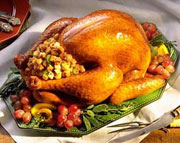
 Listen
to the news
Listen
to the news

On Thanksgiving many Americans take part in a traditional holiday
feast and express their appreciation for the bounty they have
been fortunate enough to receive. Some New Yorkers are also taking
the time to help their less fortunate neighbors.
A long line forms outside this food bank in New York City. Dozens
of people lean on their shopping carts. Bundled in warm winter
coats, hats and gloves, they wait in the crisp, early morning
hours for a free package of canned and fresh food.
Florence Messiah does not need a turkey because she is spending
Thanksgiving with relatives. But she takes a weekly trip to the
food pantry because she lives on a tight budget and can use the
free groceries.
"It makes a difference, yes, it does,a lot. You save money,
so I do not mind walking these blocks to get the stuff."
Inside, volunteers have formed an assembly line to fill brown
paper bags with food items. "There is cranberry sauce, there
are vegetables, there is canned fruit, there are some turkeys
that we will be giving out later."
Many of the volunteers have been given a morning off from work
at New York-based corporations to give back to the community before
Thanksgiving. Hester Sullivan is the deputy director of the center,
which provides groceries to more than 400 people a week and serves
hot meals to more than 100 people every day. She says before the
holidays, she can use the extra hands.
"We wanted to have extra bags because what happens is we
see a lot of people coming in for emergency food during holidays,
specially when their kids are out of school because it overtaxes
their already overtaxed burden, so it is a whole other population
that is food insecure in the holiday."
According to a new study by the private Hunger Action Network,
an estimated 900,000 New Yorkers visited emergency food programs
each week in 2002.
The report, which was based on a detailed survey of more than
600 different food programs, says that last year, demand for emergency
food rose by more than 20 percent in New York State. More than
half of the programs in the study also reported an increase in
children and senior citizens using the services.
Activists say the situation has not improved for many low-income
New Yorkers, despite indications that the economy is growing.
Officials estimate that since the September 11, 2001, attacks,
New York lost more than 100,000 jobs.
Unemployment, shrinking donations, and cuts in government programs
are reported to have contributed to difficulties in putting food
on the table.
Director of the New York City Coalition Against Hunger Joel
Berg helped conduct the survey "I will say, no, we do not
have hunger in America the same way we might in Ethiopia, or North
Korea or parts of Latin America. There are not people starving
on the street. Why? Number one, because we do have a federal nutrition
safety net, which has been reduced, but is still there, and two
we do have this incredible network of food banks, food rescue
organizations, soup kitchens, and food pantries that prevent people
from starving."
But Mr. Berg estimates that due to a growing demand for and a
shortage of supplies, food programs in New York had to turn away
more than 100,000 people last year. "In the richest city
in the planet, to have more than 100,000 people when they finally
go to get charitable food not be able to get it, really is a crisis
that needs to be addressed."
Mr. Berg is calling for an million increase in state funding,
a minimum wage hike in New York and the expansion of federal food
programs.
Back outside the food pantry, Maggie Otero has been waiting with
her two children since before dawn. She says she recently recovered
from a debilitating illness, but she faced the cold for a Thanksgiving
turkey.
"For Thanksgiving my plan is to be with my kids, to be thankful
that I am still alive and to have a family night."
Ms. Otero, who is studying to be a surgical technician, says
she hopes that next year, after she has graduated, she will have
a job to help pay for her Thanksgiving feast.
(Agencies)
